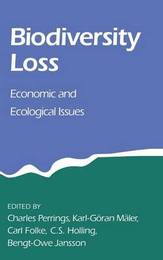
|
Biodiversity Loss: Economic and Ecological Issues
Hardback
Main Details
Description
This important book reports the findings of a research program that brought together economists and ecologists to consider the causes and consequences of biodiversity loss. It shows that while the immediate causes of biodiversity loss lie in habitat destruction and harvesting, the underlying causes are incentives that encourage resource users to ignore the effects of their actions. These effects include both loss of genetic material, and the collapse of ecosystem resilience--our "insurance" against the fundamental uncertain effects of economic and population growth. The "solutions" are argued to lie in the reform of incentives.
Reviews"[The chapters] are solid contributions to the literature. They illuminate many of the core questions of biodiversity and its conservation. They have much to say to conservation biologists, resource economists, environmental strategists, and those concerned with the role of biodiversity in national land-use planning...would make excellent assignments for graduate classes." Norman Myers, BioScience "This book may be the most significant contribution to the interdisciplinary literature on biodiversity...Well-coordinated group discussions and sharing of draft research papers, joint research projects and chapter co-authorship by ecologists and economists, and strong and thoughtful editing have resulted in a coherent volume of original and strong contributions." Richard B. Norgaard, Journal of Wildlife Management "[The chapters] are solid contributions to the literature. They illuminate many of the core questions of biodiversity and its conservation. They have much to say to conservation biologists, resource economists, environmental strategists, and those concerned with the role of biodiversity in national land-use planning...would make excellent assignments for graduate classes." Norman Myers, BioScience "This book may be the most significant contribution to the interdisciplinary literature on biodiversity...Well-coordinated group discussions and sharing of draft research papers, joint research projects and chapter co-authorship by ecologists and economists, and strong and thoughtful editing have resulted in a coherent volume of original and strong contributions." Richard B. Norgaard, Journal of Wildlife Management
|